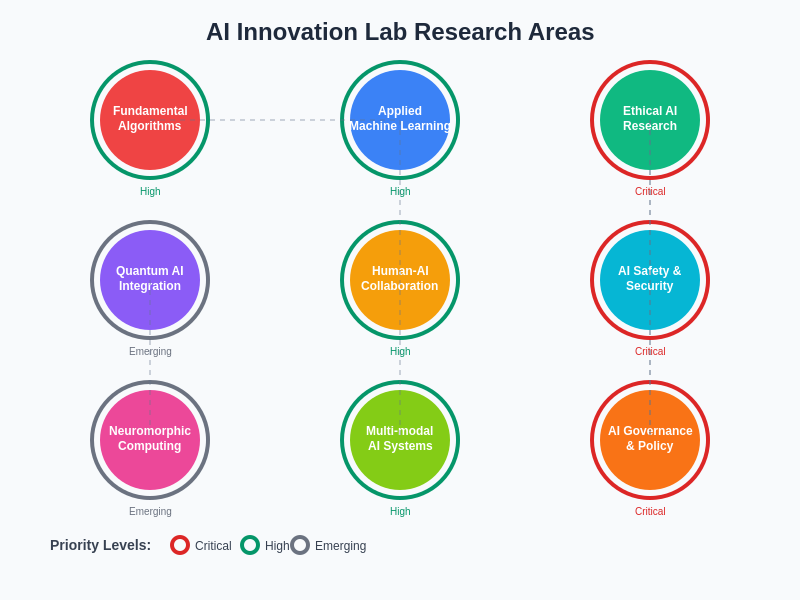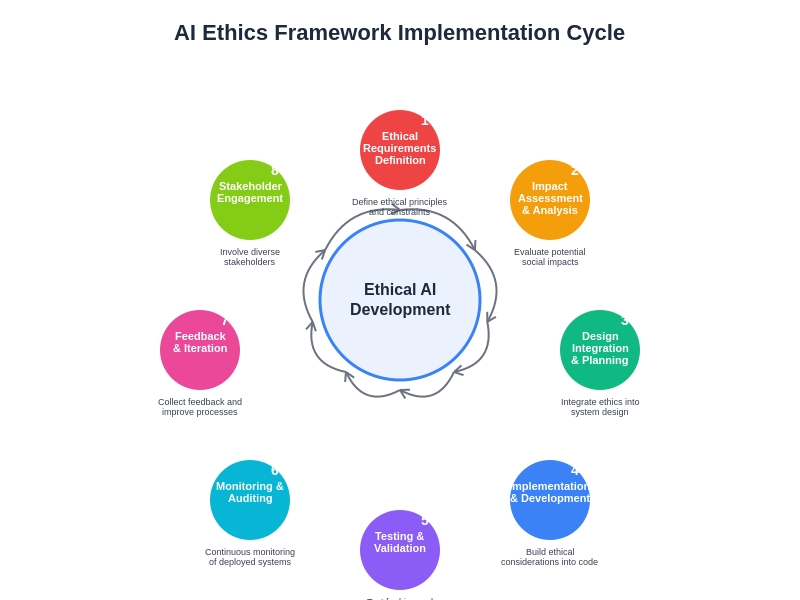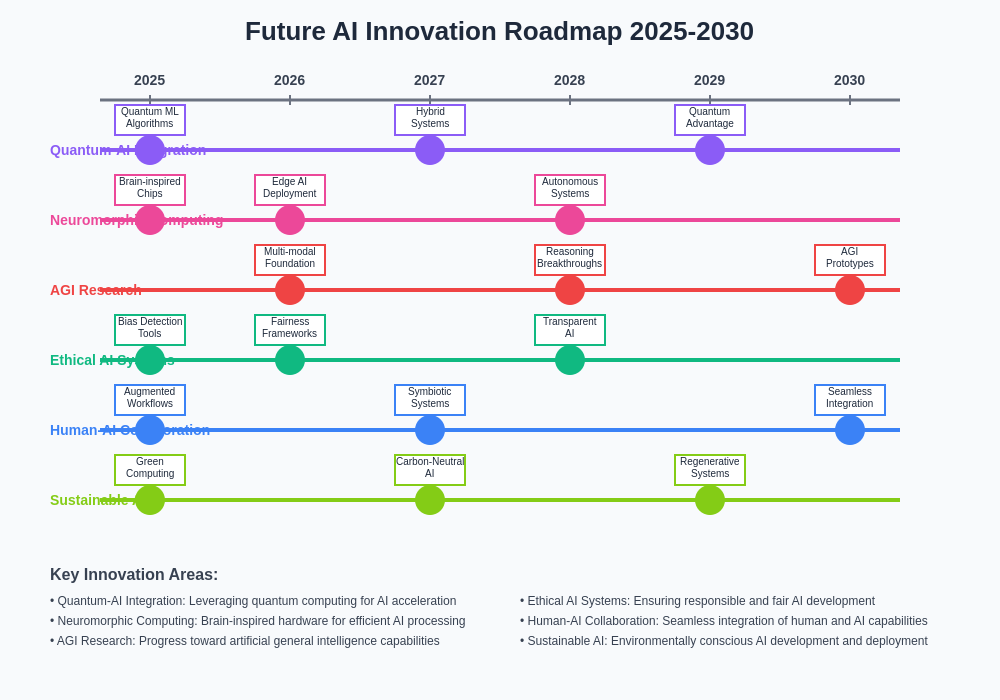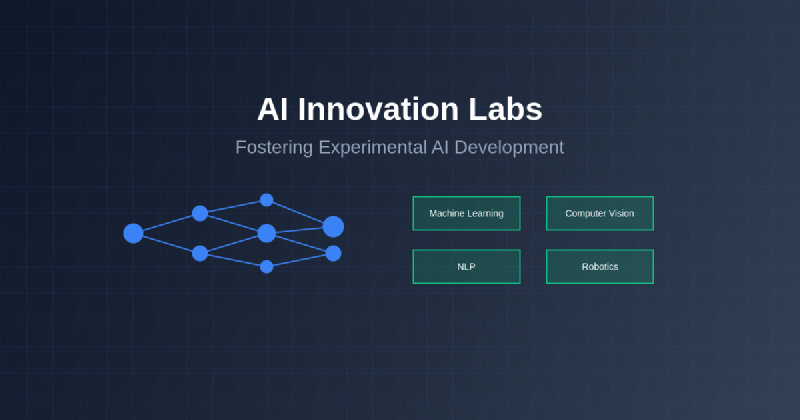The modern landscape of artificial intelligence development has witnessed the emergence of specialized innovation laboratories that serve as catalysts for groundbreaking research and experimental development. These AI innovation labs represent the vanguard of technological advancement, where theoretical concepts transform into practical applications that reshape industries and redefine the boundaries of what artificial intelligence can achieve. The significance of these laboratories extends far beyond traditional research institutions, creating dynamic ecosystems where creativity, cutting-edge technology, and visionary thinking converge to accelerate the pace of AI innovation.
Explore the latest AI trends and developments to understand how innovation labs are pushing the boundaries of artificial intelligence research and development. These specialized environments foster a culture of experimentation that enables researchers, engineers, and visionaries to explore unconventional approaches to AI challenges while maintaining the rigor and methodology necessary for meaningful scientific advancement.
The Architecture of Modern AI Innovation Labs
Contemporary AI innovation labs operate as sophisticated ecosystems designed to maximize creative potential while providing the infrastructure necessary for complex experimental development. These laboratories combine state-of-the-art computational resources with collaborative environments that encourage interdisciplinary cooperation and knowledge sharing. The physical and virtual architecture of these spaces reflects a deep understanding of how innovative thinking emerges from the intersection of diverse perspectives, advanced technology, and carefully cultivated research methodologies.
The organizational structure of successful AI innovation labs typically encompasses multiple specialized teams working on complementary aspects of artificial intelligence development. Research teams focus on fundamental algorithmic innovations and theoretical breakthroughs, while engineering teams concentrate on translating research insights into practical implementations and scalable solutions. Product development teams bridge the gap between experimental prototypes and market-ready applications, ensuring that innovative concepts can eventually benefit broader communities and industries.
The infrastructure supporting these laboratories includes high-performance computing clusters, specialized AI hardware such as GPUs and TPUs, and cloud-based resources that enable researchers to experiment with large-scale models and datasets. This technological foundation is complemented by collaborative tools and platforms that facilitate knowledge sharing, version control for experimental code, and systematic documentation of research processes and outcomes.
Cultivating Experimental Research Culture
The most successful AI innovation labs recognize that breakthrough discoveries often emerge from environments that encourage calculated risk-taking and unconventional thinking. These laboratories deliberately foster cultures where failure is viewed as a valuable learning opportunity rather than a setback, enabling researchers to pursue ambitious projects that might not succeed but could lead to transformative insights. This cultural foundation is essential for experimental AI development, where the most promising directions often emerge from seemingly impractical or speculative investigations.
Discover advanced AI capabilities and research directions through platforms that exemplify the kind of innovative thinking that emerges from experimental AI development environments. The collaborative nature of modern AI innovation labs extends beyond individual institutions, creating networks of researchers and practitioners who share insights, methodologies, and discoveries that accelerate progress across the entire field.
The recruitment and retention strategies employed by leading AI innovation labs prioritize intellectual curiosity, creative problem-solving abilities, and collaborative mindset over traditional academic credentials alone. These laboratories actively seek individuals from diverse backgrounds, recognizing that breakthrough innovations often emerge from the intersection of different disciplines and perspectives. This approach results in research teams that combine expertise in computer science, mathematics, neuroscience, psychology, philosophy, and domain-specific fields relevant to particular AI applications.
Methodologies for Experimental AI Development
Experimental AI development within innovation labs follows systematic methodologies that balance scientific rigor with creative exploration. These approaches typically begin with fundamental research questions that challenge existing assumptions or explore uncharted territories within artificial intelligence. Researchers formulate hypotheses, design experiments, and implement prototypes that test specific aspects of AI systems under controlled conditions while remaining open to unexpected discoveries and emergent behaviors.
The experimental process in AI innovation labs often involves rapid prototyping cycles that enable researchers to quickly test ideas, gather data, and iterate on their approaches. This methodology contrasts with traditional software development cycles by emphasizing learning and discovery over predetermined outcomes. Researchers utilize techniques such as ablation studies, comparative analysis, and controlled experimentation to isolate variables and understand the mechanisms underlying AI system behavior.
Documentation and reproducibility represent critical components of experimental AI development methodologies. Innovation labs maintain detailed records of experimental procedures, parameter configurations, dataset characteristics, and environmental conditions that enable other researchers to replicate and build upon previous work. This systematic approach to documentation facilitates knowledge transfer within and between laboratories while contributing to the broader scientific understanding of AI systems and methodologies.
Cross-Disciplinary Collaboration and Knowledge Integration
AI innovation labs thrive on cross-disciplinary collaboration that brings together experts from diverse fields to address complex challenges that transcend traditional academic boundaries. These collaborative efforts recognize that artificial intelligence development benefits from insights drawn from cognitive science, neuroscience, psychology, linguistics, philosophy, ethics, and domain-specific expertise relevant to particular applications. The integration of diverse perspectives often leads to innovative approaches that would not emerge from purely computer science-focused research.
The collaborative methodology employed in these laboratories typically involves structured interdisciplinary projects where experts from different fields work together to define research questions, design experiments, and interpret results. This approach ensures that AI development considers human factors, ethical implications, social impacts, and domain-specific constraints that influence the practical deployment and effectiveness of AI systems. The resulting research often produces more robust and applicable solutions that account for the complexity of real-world implementation environments.
Knowledge integration within AI innovation labs extends beyond individual projects to encompass systematic efforts to synthesize insights across different research directions and applications. These laboratories often maintain internal seminars, workshops, and collaboration platforms that enable researchers to share discoveries, identify connections between seemingly unrelated projects, and explore opportunities for cross-pollination of ideas and methodologies.

The multidimensional nature of AI research encompasses fundamental algorithmic development, application-specific innovations, ethical and social considerations, and practical implementation challenges. Innovation labs must balance these different research directions while maintaining coherent long-term strategies that advance both theoretical understanding and practical capabilities.
Technology Transfer and Practical Implementation
The ultimate value of AI innovation labs lies in their ability to translate experimental discoveries into practical applications that benefit society and drive economic growth. This technology transfer process requires sophisticated mechanisms for evaluating the commercial and social potential of research outcomes while maintaining the scientific integrity and open collaboration that characterizes effective experimental development. Successful innovation labs develop systematic approaches to identifying promising research directions that could lead to practical applications while ensuring that fundamental research continues to receive adequate support and resources.
The technology transfer process typically involves multiple stages that bridge the gap between experimental prototypes and production-ready systems. Initial proof-of-concept demonstrations validate the feasibility of research insights under controlled conditions, while subsequent development phases focus on scalability, robustness, and integration with existing systems and workflows. This progression requires collaboration between research teams and engineering teams with expertise in system design, software architecture, and deployment methodologies.
Explore comprehensive AI research and development tools that exemplify how experimental research insights can be transformed into practical applications that serve diverse user communities and use cases. The successful commercialization of AI innovation lab research often requires partnerships with industry organizations, government agencies, and academic institutions that can provide the resources and expertise necessary for large-scale deployment and adoption.
Funding Models and Sustainability Strategies
The financial sustainability of AI innovation labs represents a critical challenge that influences research directions, collaboration patterns, and long-term strategic planning. These laboratories typically employ diverse funding models that combine government research grants, corporate partnerships, venture capital investment, and revenue from technology licensing and commercialization activities. This diversified approach to funding enables laboratories to maintain independence in their research directions while ensuring adequate resources for ambitious experimental projects.
Government funding often supports fundamental research projects that may not have immediate commercial applications but contribute to the broader scientific understanding of artificial intelligence. Corporate partnerships provide access to real-world datasets, implementation challenges, and market insights that inform research directions while offering opportunities for technology transfer and commercialization. Venture capital investment enables the development of startup companies that can rapidly scale promising research insights into market-ready products and services.
The sustainability of AI innovation labs also depends on their ability to attract and retain talented researchers and engineers in an increasingly competitive market for AI expertise. This requires offering competitive compensation, providing access to cutting-edge resources and technologies, maintaining flexible and collaborative work environments, and ensuring opportunities for professional development and career advancement. Many successful laboratories also prioritize work-life balance and mission-driven research that enables individuals to contribute to socially beneficial applications of artificial intelligence.
Global Networks and Collaborative Ecosystems
Modern AI innovation labs operate within global networks that facilitate knowledge sharing, resource pooling, and collaborative research projects that transcend geographical and institutional boundaries. These networks enable laboratories to access diverse datasets, computational resources, and expertise while contributing to the collective advancement of artificial intelligence research and development. The collaborative nature of these networks accelerates progress by enabling researchers to build upon each other’s work and avoid duplicating efforts across different institutions.
International collaboration within AI innovation lab networks often focuses on addressing global challenges that require coordinated research efforts and shared resources. Climate change, healthcare access, educational equity, and sustainable development represent examples of areas where AI innovation labs collaborate across borders to develop solutions that benefit multiple communities and regions. These collaborative efforts demonstrate the potential for AI research to address pressing societal challenges while advancing scientific understanding.
The governance and coordination of global AI innovation lab networks require sophisticated mechanisms for managing intellectual property, sharing resources, coordinating research directions, and ensuring equitable participation across different institutions and regions. Many networks employ consortium models that enable member laboratories to contribute resources and expertise while maintaining autonomy in their specific research focuses and methodologies.
Ethical Considerations and Responsible Innovation
AI innovation labs bear significant responsibility for ensuring that their research contributes to the development of artificial intelligence systems that benefit society while minimizing potential risks and negative consequences. This responsibility requires integrating ethical considerations into all aspects of the research process, from initial project conception through experimental design, implementation, and technology transfer. Responsible innovation practices help ensure that AI development serves human values and promotes social welfare while respecting individual rights and autonomy.
The ethical framework employed by responsible AI innovation labs typically encompasses multiple dimensions including fairness, transparency, accountability, privacy, and social impact. These considerations influence research priorities, experimental methodologies, data collection and usage practices, and technology transfer decisions. Many laboratories establish ethics review boards or advisory committees that provide guidance on research projects and help identify potential ethical implications of different research directions.

The systematic integration of ethical considerations throughout the AI development lifecycle ensures that responsible innovation principles guide decision-making at every stage of the research and development process. This comprehensive approach helps prevent ethical issues from emerging later in the development cycle when they may be more difficult and expensive to address.
The practical implementation of ethical AI research requires sophisticated methodologies for evaluating bias, fairness, and social impact across different applications and user communities. Innovation labs develop specialized techniques for testing AI systems under diverse conditions, measuring performance across different demographic groups, and identifying potential sources of bias or discrimination. These methodologies contribute to the broader field of AI ethics research while ensuring that laboratory outputs meet high standards for responsible innovation.
Measuring Impact and Success Metrics
The evaluation of AI innovation lab effectiveness requires sophisticated metrics that capture both scientific contributions and practical impact across multiple dimensions and timeframes. Traditional academic metrics such as publication counts and citation indices provide valuable insights into research productivity and scientific influence, but they may not fully capture the broader societal and economic impacts that represent the ultimate goals of innovation-focused research. Comprehensive evaluation frameworks therefore incorporate diverse measures of success that reflect the multifaceted objectives of modern AI innovation labs.
Scientific impact metrics include breakthrough discoveries that advance fundamental understanding of artificial intelligence, methodological innovations that enable new research directions, and theoretical contributions that influence the broader research community. These measures often focus on the novelty and significance of research contributions rather than simply the quantity of publications or patents generated. Many laboratories also track the adoption of their research insights by other institutions and the extent to which their work influences subsequent research directions and applications.
Practical impact metrics encompass the translation of research insights into applications that benefit society and drive economic growth. These measures include the number and success of startup companies founded based on laboratory research, the licensing of technologies to established organizations, the adoption of laboratory-developed methodologies by industry practitioners, and the measurable improvements in efficiency, effectiveness, or social welfare resulting from deployed AI systems.
Future Directions and Emerging Opportunities
The evolution of AI innovation labs continues to accelerate as new technologies, methodologies, and applications create opportunities for experimental development and breakthrough discoveries. Emerging areas such as quantum computing integration with AI systems, biological and neuromorphic computing approaches, and advanced human-AI collaboration represent frontier research directions that could fundamentally reshape the capabilities and applications of artificial intelligence. Innovation labs positioned at the forefront of these emerging areas have the potential to drive transformative advances that create new industries and solve previously intractable challenges.
The increasing sophistication of AI systems also creates opportunities for meta-research that focuses on understanding and improving the AI development process itself. This includes research into automated machine learning, neural architecture search, interpretability and explainability methods, and systematic approaches to AI system evaluation and validation. These meta-research directions could accelerate the pace of AI innovation while improving the reliability and trustworthiness of AI systems across different applications and domains.

The strategic roadmap for AI innovation extends across multiple research domains and application areas, with emerging technologies creating new possibilities for experimental development and practical implementation. Innovation labs must balance exploration of frontier research areas with continued advancement in established domains to maximize both scientific discovery and practical impact.
The global expansion of AI innovation lab networks creates opportunities for addressing challenges that require international collaboration and resource sharing. Climate change mitigation, pandemic response, sustainable development, and space exploration represent examples of areas where coordinated AI research could produce solutions that benefit all humanity. The development of frameworks for effective international collaboration will be essential for realizing the full potential of global AI innovation networks.
Conclusion and Long-term Vision
AI innovation labs represent essential catalysts for the continued advancement of artificial intelligence research and development, providing the specialized environments, resources, and expertise necessary for breakthrough discoveries and practical innovations. The success of these laboratories depends on their ability to balance scientific rigor with creative exploration, fundamental research with practical applications, and individual achievement with collaborative progress. As artificial intelligence continues to reshape industries and societies, the role of innovation labs in fostering responsible and beneficial AI development becomes increasingly critical.
The long-term vision for AI innovation labs encompasses the creation of a global ecosystem where breakthrough research, ethical considerations, and practical applications work together to advance human welfare and scientific understanding. This vision requires continued investment in research infrastructure, talent development, international collaboration, and responsible innovation practices that ensure AI development serves the common good while pushing the boundaries of what artificial intelligence can achieve.
The future of AI innovation will likely be characterized by even greater integration between different research institutions, closer collaboration between academic and industry partners, and more sophisticated approaches to translating experimental discoveries into practical benefits for society. The laboratories that thrive in this environment will be those that successfully navigate the complex balance between exploration and exploitation, innovation and responsibility, and individual excellence and collaborative progress.
Disclaimer
This article is for informational purposes only and does not constitute professional advice. The views expressed are based on current understanding of AI innovation lab practices and their role in advancing artificial intelligence research and development. Readers should conduct their own research and consider their specific requirements when evaluating AI innovation opportunities. The effectiveness and impact of AI innovation labs may vary depending on specific research focuses, funding models, and institutional contexts.
